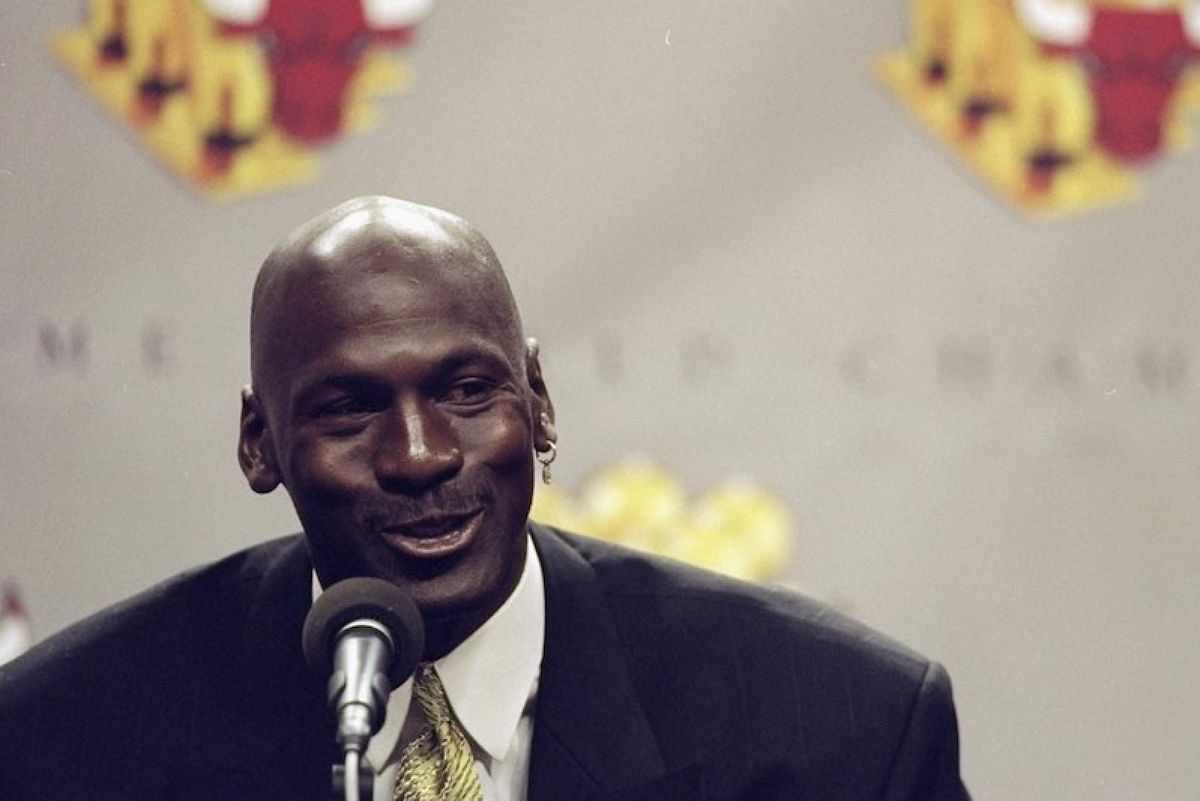
Screen shot 2020 05 18 at 11 42 34 am
Photo Credit: Jonathan Daniel /Allsport Via Getty

After five long weeks, and ten electrifying episodes, we can all go back to whatever we were doing Sunday nights. The last two episodes of ESPN's The Last Dancehave aired, and our journey with the team of the '90s and the player of a generation has concluded.
Throughout the docuseries, the timeline for the series has bounced around, exploring not only the decade-long Chicago Bulls dynasty but also further back into some of the earlier moments in the careers and lives of the players. In the last two episodes, the timeline was fixed in the 1997 and '98 playoffs: episode nine focusing on '97 and episode 10 on '98.
The episodes covered Michael Jordan's relationship with Steve Kerr and MJ's iconic "Flu Game" performance before wrapping up nicely with his game-winning — and what should have been — last shot in the NBA. The series didn't look beyond that final moment — because we know what happened next — but it felt abrupt in the best way possible. We wanted more of the Chicago Bulls but the dynasty was cut short and so was this story, save for one last highlight montage set up by His Airness saying, "All you needed was one little match to start that whole fire."
\u201cMichael Jordan\u2019s \u201cThe Last Shot\u201d in a Bulls jersey. \ud83c\udfc6\ud83c\udfc6\ud83c\udfc6\ud83c\udfc6\ud83c\udfc6\ud83c\udfc6 #TheLastDance\u201d— \u0299\u1d0c\u1d00s\u026a\u1d1c (@\u0299\u1d0c\u1d00s\u026a\u1d1c) 1589788894
Michael Jordan was, for obvious reasons, a significant element in the excitement surrounding this documentary. The Chicago Bulls would not have become the dynasty that it did without MJ. But a welcomed surprise was the inclusion and recognition given to the other guys — those who didn't have their silhouette on a shoe.
Guys like Scottie Pippen, Dennis Rodman, and Phil Jackson had their stories told freely and not always in conjunction with Jordan's. Even other role players like Kerr, B.J. Armstrong, and Bill Paxton got their own space to speak on their experiences during the championship runs. These players — along with coaches, trainers, general managers, competitors — gave greater insight on some moments that we now view as cultural artifacts. The series unraveled in fable-like stories that were all part of a larger collection. Up until this point, we were under the impression that Jordan had the flu in Game 5 of the NBA Finals against the Utah Jazz. Thanks to Jordan's trainer, Tim Grover, we now know it was food poisoning from pizza ordered late the night prior to the game.
The Last Dance highlighted a facet of Jordan's life that we had hardly seen before: his humanity. Michael Jordan has always been viewed as either a basketball player or a brand. This isn't anybody's fault in particular. For the most part, all we've seen him do is play basketball and sell shoes. The footage from The Last Dance shows his very human interactions with his teammates and his competition. From laughing and telling stories about his teammates to almost crying over them, we see a full range of emotions from MJ as the series goes on.
The humanization of MJ was well done, but one human aspect that was missing was his relationship with his family. If you were to watch this documentary without any knowledge of Michael Jordan, you wouldn't have known he had children until the final episode, and that he was married throughout the entirety of his six championships. His three children with his first wife — Jeffrey, Marcus, and Jasmine — have a short cameo in the final episode, but weren't present for anything else unless you count the short clip of Jeffrey and Marcus dribbling basketballs as young boys.
Understandably, The Last Dance wasn't just about Jordan and it definitely wasn't about his family. But a significant objective of the docuseries was to pull back the curtain and show MJ in a manner unlike what we've normally seen — him as this god-like figure. He was depicted as an average man from humble beginnings who steadily grew into the most iconic figure basketball had ever seen. Of course, his family didn't lace their shoes up and play on the court alongside him, but it's hard to think that Michael Jordan — the man motivated by any and everything — wasn't at all motivated by his family.
\u201cMichael Jordan put up 31.7 PPG in a seven-game 1998 Eastern Conference Finals to advance the @chicagobulls into their sixth #NBAFinals!\u201d— NBA (@NBA) 1589814058
All in all, watching The Last Dance was like listening to a greatest hits album. You know the songs already just like you know the shots going in, but you still sit there and enjoy it like it's your first time — and for some people it was. This docuseries brought basketball fans of all shapes and sizes together for one day out of the week. It was great for fans who lived through the Bulls' '90s tear and wanted to live it again, and for younger fans of today's game who've only seen Michael Jordan on YouTube.
The Last Dance felt like a cultural reset. We all watched the same series but participated in our own way, bringing whatever consciousness of Michael Jordan and the Bulls we had with us, and leaving with something else. The Last Dance was a special moment that captured the attention of everyone watching, and showed us all just how important Michael Jordan was — and still is — to basketball.
__
Jordan Pandy is a writer from the DMV who covers culture, music, and sports. You can follow him @JordanPandy_